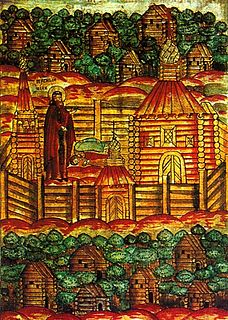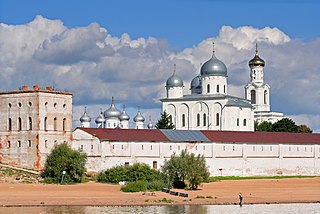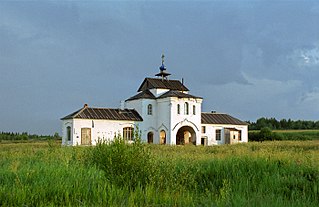Serapion (Russian : Серапион) (died March 16, 1516) was Archbishop of Novgorod the Great and Pskov from 1506 to 1509. He is a saint of the Russian Orthodox Church; his feast day is March 16 by the Julian calendar.

Russian is an East Slavic language, which is official in the Russian Federation, Belarus, Kazakhstan and Kyrgyzstan, as well as being widely used throughout Eastern Europe, the Baltic states, the Caucasus and Central Asia. It was the de facto language of the Soviet Union until its dissolution on 25 December 1991. Although, nowadays, over two decades after the breakup of the Soviet Union, Russian is used in official capacity or in public life in all the post-Soviet nation-states, as well as in Israel and Mongolia, the rise of state-specific varieties of this language tends to be strongly denied in Russia, in line with the Russian World ideology.

The Russian Orthodox Church, alternatively legally known as the Moscow Patriarchate, is one of the autocephalous Eastern Orthodox Christian churches. The Primate of the ROC is the Patriarch of Moscow and all Rus'. The ROC, as well as the primate thereof, officially ranks fifth in the Orthodox order of precedence, immediately below the four ancient patriarchates of the Greek Orthodox Church, those of Constantinople, Alexandria, Antioch, and Jerusalem. Since 15 October 2018, the ROC is not in communion with the Ecumenical Patriarch of Constantinople, having unilaterally severed ties in reaction to the establishment of the Orthodox Church of Ukraine, which was finalised by the Ecumenical Patriarchate on 5 January 2019.
The Julian calendar, proposed by Julius Caesar in 46 BC, was a reform of the Roman calendar. It took effect on 1 January 45 BC, by edict. It was the predominant calendar in the Roman world, most of Europe, and in European settlements in the Americas and elsewhere, until it was refined and gradually replaced by the Gregorian calendar, promulgated in 1582 by Pope Gregory XIII.
Serapion came from the Muscovite village of Pekhorka (now Pekhra-Pokrovskoye within Balashikha in Moscow Oblast). He took monastic vows in the Dubensk Dormition monastery, where he went on to become hegumen. He was subsequently hegumen of the Stromyn Dormition monastery (both cloisters were liquidated in the 18th century), and then became hegumen of the Trinity monastery (now Troitse-Sergiyeva Lavra) in 1493.

Balashikha is a city in Moscow Oblast, Russia, located on the Pekhorka River 1 kilometer (0.62 mi) east of Moscow Ring Road. Population: 215,494 (2010 Census); 147,909 (2002 Census); 135,841 (1989 Census); 92,400 (1970).

Moscow Oblast, or Podmoskovye, is a federal subject of Russia. With a population of 7,095,120 living in an area of 44,300 square kilometers (17,100 sq mi), it is one of the most densely populated regions in the country and is the second most populous federal subject. The oblast has no official administrative center; its public authorities are located in Moscow and across other locations in the oblast.

A monk is a person who practices religious asceticism by monastic living, either alone or with any number of other monks. A monk may be a person who decides to dedicate his life to serving all other living beings, or to be an ascetic who voluntarily chooses to leave mainstream society and live his or her life in prayer and contemplation. The concept is ancient and can be seen in many religions and in philosophy.
With the consent of Great Prince Vasily III of Moscow, he was consecrated Archbishop of Novgorod on January 15, 1506, but only served a little over three years. In July 1509, at the Sobor that considered the conflict between him and Joseph Volotsky (the latter was under Serapion's episcopal jurisdiction but had directly appealed to Simon, Metropolitan of Moscow - an act that Serapion deemed to be uncanonical), and his letter of complaint, in which he said Joseph had abandoned heavan (meaning he had abandoned his rightful bishop) and descended to earth. The grand prince took this as a personal insult, that Serapion was claiming the local prince was divinely mandated and Grand Prince Vasilii III was mundane. Serapion was found guilty, removed from office, and confined to the Andronikov monastery. In 1511, he was freed and spent the rest of his life in the Trinity monastery. He died on March 16, 1516. Sources claim he made peace with Volotsky and others, but there is some evidence that he remained bitter at his removal to the end of his life. After his death, the See of Novgorod remained vacant for 17 years. [1]
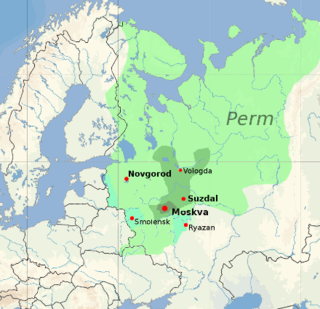
The Grand Duchy of Moscow, Muscovite Rus' or Grand Principality of Moscow was a Rus' principality of the Late Middle Ages centered around Moscow, and the predecessor state of the Tsardom of Russia in the early modern period.
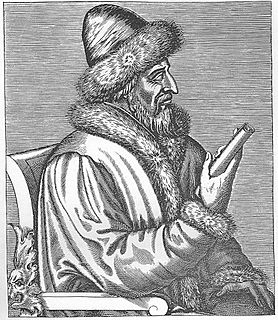
Vasili III Ivanovich was the Grand Prince of Moscow from 1505 to 1533. He was the son of Ivan III Vasiliyevich and Sophia Paleologue and was christened with the name Gavriil (Гавриил). He had three brothers: Yuri, born in 1480, Simeon, born in 1487 and Andrei, born in 1490, as well as five sisters: Elena, Feodosiya, another Elena, another Feodosiya and Eudoxia. He is sometimes mockingly referred to as Vasili the Adequate due to his rule taking place between those of Ivan the Great and Ivan the Terrible, as well as the relative uneventfulness of his reign.
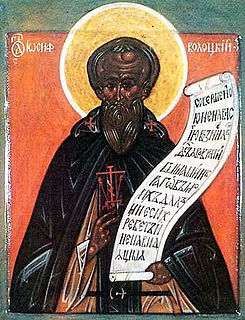
Joseph Volotsky — also known as Joseph of Volotsk or Joseph of Volokolamsk ; secular name Ivan Sanin — was a prominent Russian theologian and early proponent of tsarist autocracy, who led the party defending monastic landownership. The Russian Orthodox Church considers him a saint ; his memory is celebrated on 9 September and 18 October.
- ↑ Michael C. Paul, “Continuity and Change in the Novgorodian Archiepiscopal Office, 1478-1591," Orientalia Christiana Periodica, Vol. 5, No. 2 (2009) pp. 273-317.







